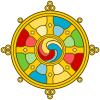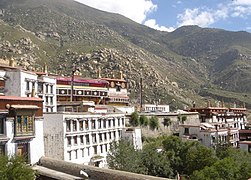List of Tibetan monasteries
This section contains content that is written like an advertisement. (March 2018) |
| Part of a series on |
| Tibetan Buddhism |
|---|
 |
This list of Tibetan monasteries is a listing of historical and contemporary monasteries of Tibetan Buddhism within the ethno-cultural Tibet itself and elsewhere. Tibetan monasteries are works of architectural, pictorial, decorative and landscape art.[1]
| Name | Location | Tradition | Established | Destroyed | Note |
|---|---|---|---|---|---|
| Alchi | Ladakh | Gelug | 11th century | ||
| Badekar Monastery | Bugat, Inner Mongolia Autonomous Region | Gelug | 1749 | ||
| Chagri Monastery | Bhutan | Kagyu | 1620 | ||
| Chaksam Cho Ri | Chushul, U-Tsang | 14th century | Destroyed in 1959 | from Chaksam Bridge diagram made in 1878 | |
| Dorje Drak | Lhoka | Nyingma | 1400, 1720, 1960s in India | 1717, 1960s | One of the six "Nyingmapa mother monasteries." |
| Drepung | Lhasa | Gelug | 1416 | Home monastery of the Dalai Lama and founded by Jamyang Choje. Drepung was historically the largest monastery in Tibet as well as the largest in the world until the annexation of Tibet by the People's Republic of China | |
| Drigung | Lhasa Prefecture | Kagyu | 1179, 1980s | 1960s | |
| Drongtse Monastery | Tsang | ||||
| Dzogchen | Kham | Nyingma | 1684 | One of the six "Nyingmapa mother monasteries." | |
| Ganden | Lhasa Prefecture | Gelug | 1409 | 1959, 1966 | Seat of the Ganden Tripa. Founded by Tsongkhapa in 1409. |
| Gonchen Monastery | Kham | Sakya | 1729 | ||
| Gongkar Chöde | Lhokha | Sakya | 1464 | ||
| Tsang | Gelug | 1433 and 1475 | [2] | ||
| Hemis | Ladakh | Drukpa | 1672 | ||
| Jokhang Temple | Lhasa | Gelug | 652 | Severely Damaged by People's Liberation Army in March, 1959 | Lhasa main temple. Said to have been built by King Songtsen Gampo in 647; a major pilgrimage site. |
| Tsang | Jonang | 14th century | |||
| Kardang | Lahaul | Drukpa | 12th century | Main monastery in Lahaul. | |
| Karma Gön Monastery | Kham | Kagyu | 1147 | Seat of the 1st to the 7th Tai Situpa | |
| Katok | Garze | Nyingma | 1159 | One of the six "Nyingmapa mother monasteries". | |
| Ü | Nyingma | mid-8th century | |||
| Key Monastery | Lahaul and Spiti district, Himachal Pradesh | Gelugpa | 11th century | ||
| Lhokha | Nyingma | 16th century | |||
| Lhokha | |||||
| Western Tibet | |||||
| Kirti Gompa | Amdo | Gelug | 1472 | ||
| Kumbum Monastery | Amdo | Gelug | 1583 | ||
| Labrang Monastery | Amdo | Gelug | 1709 | Was founded in 1709 by the first Jamyang Zhaypa, Ngawang Tsondru. | |
| Lhuntse Dzong | Bhutan | Nyingma | 1654 | The 14th Dalai Lama arrived at Lhuntse Dzong on 26 March 1959, on his way to exile in India. | |
| Amdo | Gelug | 1646[3] | |||
| Menri | Ü | Bön | 1405 | 1386, 1966 | |
| Menri Monastery | Tsang | ||||
| Mindrolling | Lhokha | Nyingma | One of the six "Nyingmapa mother monasteries." | ||
| Penpo | [4] | ||||
| Amdo | |||||
| Namgyal Monastery | Lhasa | ||||
| Ngaba, Amdo | |||||
| Narthang Monastery | Tsang | ||||
| Nechung Temple | Lhasa | ||||
| Ngor Temple | Ü | Sakya | 1429 | 1959[5] | |
| Nyethang Drolma Lhakhang Temple | Ü | ||||
| Pabonka Hermitage | Lhasa | Gelug | 7th century | Independent before 1959, has belonged to Sera since 1980. | |
| Gyantse Palkor Chöde Monastery (Palcho Monastery) | Tsang | Gelug, Sakya, Kadam | 1428 | ||
| Palpung | Derge | Kagyu | 1727 | Founded by the 8th Situ Panchen, Seat of the Tai Situpa and Jamgon Kongtrul. | |
| Palyul | Palyul | Nyingma | One of the six "Nyingmapa mother monasteries". Other branch "Namdroling Monastery" established by Penor Rinpoche in India, in 1963 | ||
| Pemayangtse Monastery | Sikkim | Nyingma | 1705 | ||
| Pomda Monastery | Baxoi | ||||
| Punakha Dzong | Bhutan | Drukpa | Winter home of the Central Monk Body | ||
| Ralung Monastery | Tsang | ||||
| Ralung | Drukpa | Seat of the Gyalwang Drukpa | |||
| Ramoche Temple | Lhasa | ||||
| Rato Dratsang | Karnataka | Gelug | Formerly on the outskirts of Lhasa, but now re-established in south India. | ||
| Ü | |||||
| Reting | Ü | Gelug | |||
| Riwoche | Kham | Kagyu | Seat of the Taklung Kagyu lineage. | ||
| Rongbuk | Nyingma | 1902 | |||
| Amdo | |||||
| Rumtek Monastery | Sikkim | Kagyu | 18th century | ||
| Sakya Monastery | Tsang | Sakya | Seat of the Sakya Trizin. | ||
| Samye Monastery | Ü | 775 - 779 | |||
| Samye | Nyingma | First monastery in Tibet, established by Padmasambhava and Shantarakshita. Heinrich Harrer in 1982 flew over "Samye; it was totally destroyed. One can still make out the outer wall, but none of the temples or stupas survives."[6] | |||
| Lhokha | [7]
1950 photo of Sekhar Gutog (sras mkhar dgu thog) monastery in Lhodrag by Hugh Richardson. Founded by Milarepa in the 11th century[8] | ||||
| Sanga Monastery | Lhokha | ||||
| Sera | Lhasa | Gelug | One of the largest monasteries in Tibet, containing numerous colleges. Founded by Chöje Shakya Yeshe. [[:|Photo of smashed statues pieces at Lhasa's Sera Monastery destroyed by the Communist Chinese after 1959 flight of the 14th Dalai Lama to exile in India.]] | ||
| Shalu | Tsang | Sakya | |||
| Shechen | Kham | Nyingma | One of the six "Nyingmapa mother monasteries". | ||
| Simbiling Monastery | ... | ||||
| Spituk | Ladakh | Gelug | |||
| Surmang Monastery | Kham | 1988 | |||
| Surmang | Kagyu | Seat of the Trungpa tülkus. | |||
| Tabo | Spiti | Gelug | Largest monastery in Spiti. | ||
| Taklung Monastery | Ü | ||||
| Taktsang Monastery | Dzoge, Amdo | ||||
| Tamzhing Monastery | Bhutan | Nyingma | 1501 | ||
| Tashichho Dzong | Thimphu | Drukpa | Houses the Central Monk Body in summer. | ||
| Tashilhünpo | Tsang | Gelug | Seat of the Panchen Lama. Founded by Gyalwa Gendün Drup. | ||
| Tawang Monastery | Tawang District, Arunachal Pradesh | Gelug | 1681 | The monastery is the second-largest in Asia.[9] | |
| Thikse Monastery | Ladakh | Gelug | 15th century | ||
| Tholing Monastery | West Tibet | ||||
| Tibet Institute Rikon | Rikon, Switzerland | Nyingma | Since 2007, the monastery comprises representatives of all four great traditions : Nyingma, Kagyu, Sakya and Gelug. | ||
| Tsang | |||||
| Tradruk Temple | Lhokha | Gelug | The largest, oldest and most important monastery in the Yarlung Valley. Said to have been built by King Songtsen Gampo. | ||
| Lhokha | |||||
| Nagchu | |||||
| Western Tibet | |||||
| Lhokha | |||||
| Amdo | |||||
| Tsozong Gongba | Nyingma | ||||
| Dharamshala, Himachal Pradesh | Current residence of the 14th Dalai Lama. | ||||
| Tsurphu | Ü | Kagyu | Seat of the Gyalwa Karmapa. | ||
| Rebkong, Amdo | |||||
| Yarchen Gar | Nyingma | 1985 | Largest monastery in the world +10000 monks. | ||
| U-tsang | Gelug | 18th century | "Yarlung Sheldrak is a monastic community that first developed around a Padmasambhava meditation cave, possibly as early as the eighth century. It was converted to the Geluk tradition in the nineteenth century."[10] | ||
| Tsang | |||||
| Yerpa | Gelug | 600–700 | 1959 | Famous meditation site of King Songtsen Gampo and Padmasambhava; 300 monks lived here in 1959. | |
| Yonghe Temple | Beijing | Gelug | 1700s | National centre of Lama administration during Qing dynasty | |
| Tsang | [11] |
Gallery[]

Samye Monastery in Dranang

Ganden Monastery in Lhasa with some ruins visible from destruction by the Communist Chinese after 1959 flight of the 14th Dalai Lama to exile in India.

Sera Monastery in Lhasa

Drepung Monastery in Lhasa
Tashilhunpo in Shigatse
References[]
- ^ "Tibetan Buddhist Art". www.metmuseum.org. Archived from the original on 2018-03-08. Retrieved 2018-10-24.
- ^ Berzin, Alexander (1991-09-01). "A Brief History of Gyumay and Gyuto Lower and Upper Tantric Colleges". Study Buddhism. Original version published in "Gelug Monasteries." Chö-Yang, Year of Tibet Edition (Dharamsala, India), (1991). Archived from the original on 2016-06-04. Retrieved 2016-06-06.
- ^ "{title}". Archived from the original on 2017-03-31. Retrieved 2017-03-30.
- ^ Berzin, Alexander (1991-09-01). "A Brief History of Nalendra Monastery". Study Buddhism. Original version published in "Sakya Monasteries." Chö-Yang, Year of Tibet Edition (Dharamsala, India), (1991). Archived from the original on 2016-06-29. Retrieved 2016-06-06.
- ^ Carnahan, Sumner; Rinpoche, Lama Kunga (1995). In the Presence of My Enemies : Memoirs of Tibetan Nobleman Tsipon Shuguba. Foreword by Lobsang Lhalungpa. Santa Fe, NM: Clear Light Publishers. pp. 18 and 19. ISBN 9781574160444. OCLC 947820220.
(page 18 photo caption)- "Ngor Monastery, 1956, before destruction by Chinese Communists." and (page 19 photo caption)- "Ngor Monastery, 1980. The monastery was destroyed by the Chinese during the 'Cultural Revolution.' "
- ^ 1912-2006., Harrer, Heinrich (1985) [1984]. Return to Tibet: Tibet After the Chinese Occupation. Harmondsworth: Penguin Books. ISBN 9780140077742. OCLC 13856937.CS1 maint: numeric names: authors list (link)
- ^ Berzin, Alexander (1991-09-01). "A Brief History of Drug Sang-ngag Choling Monastery". The Berzin Archives. Original version published in "Kagyü Monasteries." Chö-Yang, Year of Tibet Edition (Dharamsala, India), (1991). Archived from the original on 2016-06-29. Retrieved 2016-06-06.
- ^ Richardson, Hugh (1950), English: Sekhar Gutog (sras mkhar dgu thog) monastery in Lhodrag near the Bhutan border founded by Milarepa in the 11th century. The famous nine-storeyed tower can clearly be seen on the left. Harvested crops may be seen in the field in the foreground., archived from the original on 2015-11-23, retrieved 2018-01-14
- ^ "Tawang monastery | Tawang District, Government of Arunachal Pradesh | India".
- ^ "Yarlung Sheldrak". Treasury of Lives. 20 January 2018. Archived from the original on 2018-01-21.
- ^ Berzin, Alexander (1991-09-01). "A Brief History of Yungdrungling Monastery". The Berzin Archives. Original version published in "Bön Monasteries." Chö-Yang, Year of Tibet Edition (Dharamsala, India), (1991). Archived from the original on 2016-06-29. Retrieved 2016-06-06.
External links[]
- Monastery List for Tibet, Mapping Buddhist Monasteries Wiki
- Monastery list with coordinates
Categories:
- Tibetan architecture
- Tibetan Buddhist monasteries
- Tibet-related lists
- Lists of Buddhist buildings and structures
- Lists of monasteries




